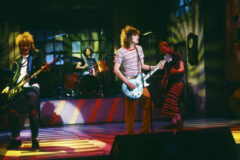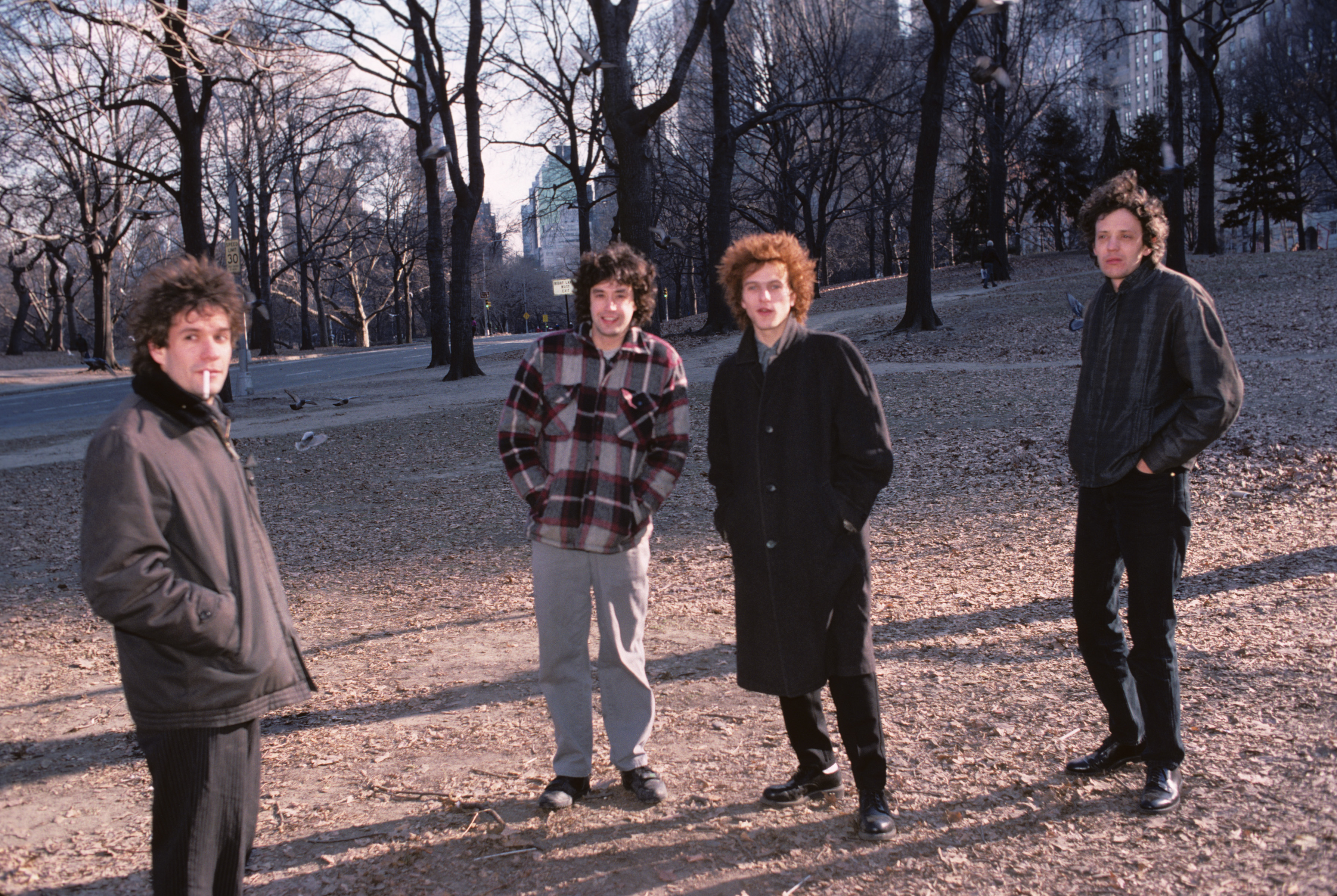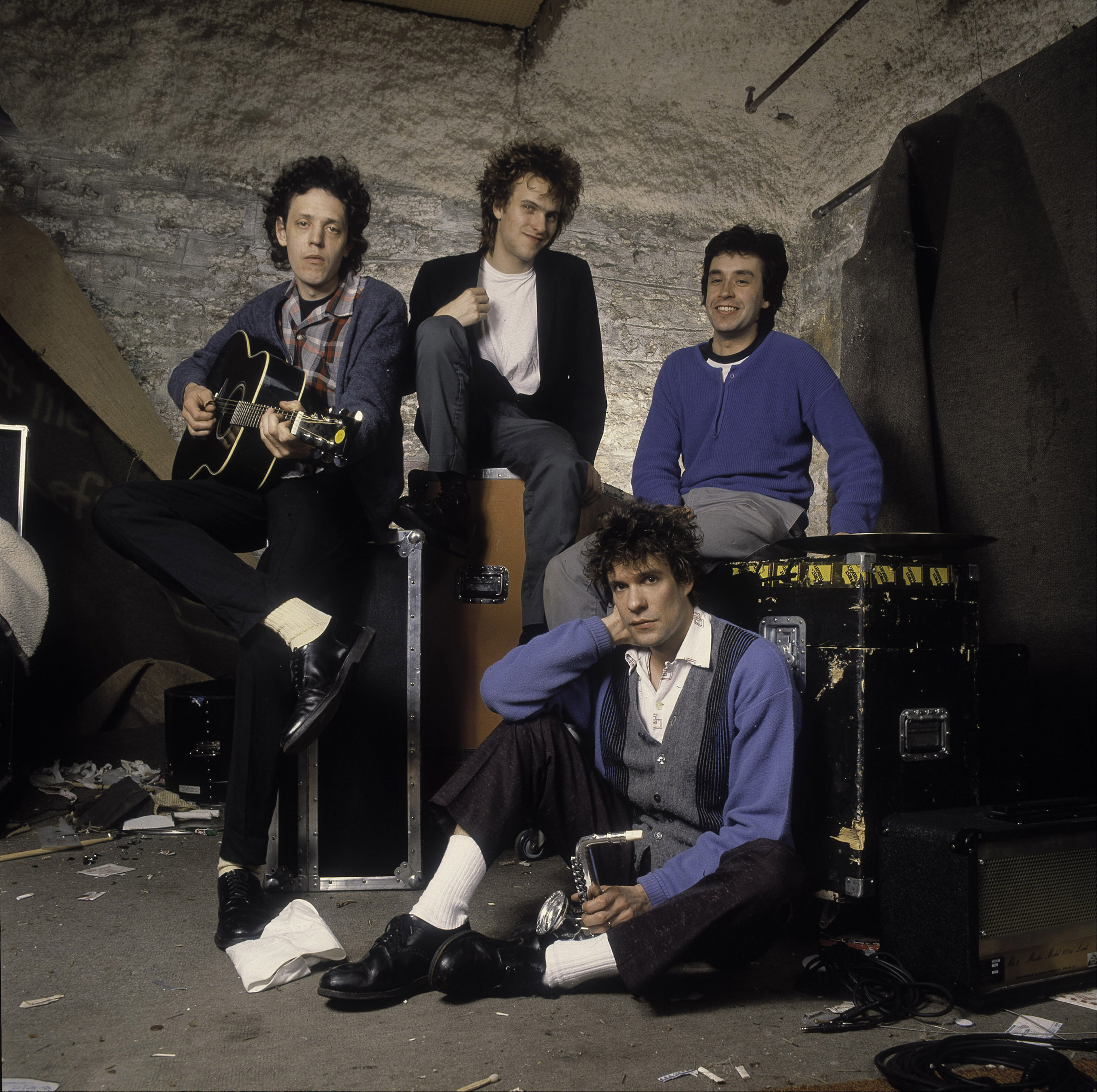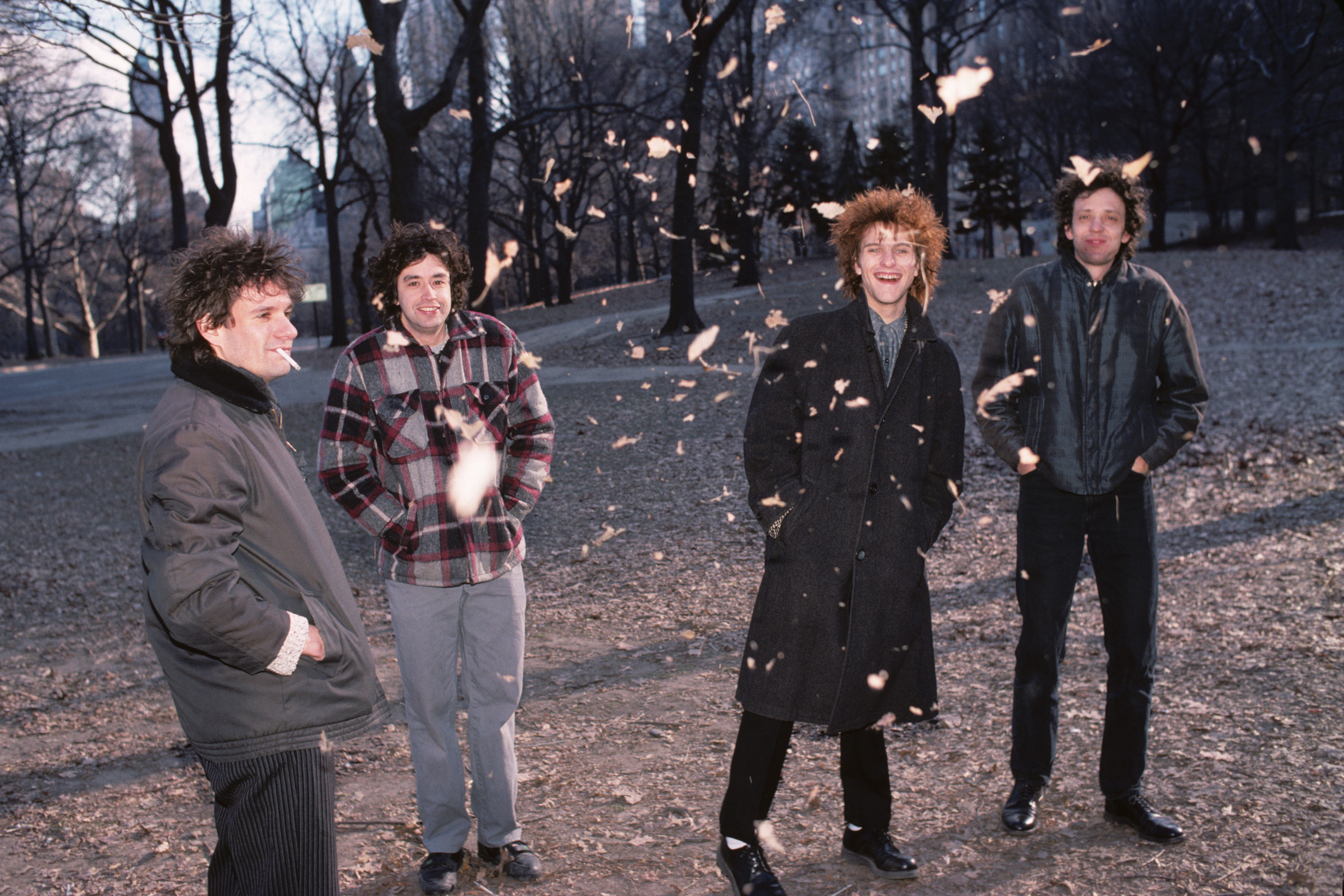This article originally appeared in the April 1989 issue of SPIN.
“Hey, where’s Tommy?
Someone find Tommy
We’re out on the road
Movin’ equipment
Where’s the equipment?
Soon we’re goin’ home”
–“We’re the Replacements,” by They Might Be Giants
Winter, 1985
I’m glad I wasn’t driving, that’s all I know. We were barely an hour out of Austin, two more hours to Houston, and my forehead was already resting on the van’s lime-green shag carpet, with Chef Boyar-dee and Jim Beam wreaking havoc in my innards. The eight of us were on our second fifth of cheap bourbon, as part of our preparation. We were going to see the Replacements.
We geared up with cassettes of the early ‘Mats classics: Sorry Ma, Forgot to Take Out the Trash, Hootenanny and Let It Be—even a side of the aptly-named hardcore LP, Stink!, which doesn’t sound half-bad when you’ve got a stomach full of bourbon and Spaghetti-O’s. Tim, the band’s major label debut, had just come out, but we were sure the band would play all those songs that night and we wanted to keep them fresh. Man, were we hyped! When we killed the second bottle and passed it around for each of us to sign, I wrote “P.W.I.G” There wasn’t enough room to write “Paul Westerberg Is God.” I was young and high and brave and going to live forever.

Also Read
Every Replacements Album, Ranked
Inside the grimy arts warehouse, it sounded like a wino was plucking at a three-stringed electric guitar while some idiots in the back kept screaming, “the letter!” and “cry like a baby!” Turns out that opening act Alex Chilton had taken the stage half an hour early at the promoter’s insistence. In the front of the stage was a kiddie’s wading pool filled with beige water, and sitting in that pool, fully clothed were Paul Westerberg and Tommy Stinson, the irreplaceable ‘Mats, drinking Jack Daniels from the largest bottle it comes in.
A lot of people in the crowd were drinking hootch, openly, and I felt silly pulling our last bottle of Jim Beam from my B.V.D.’s. Then—no warning, no run to the exit or bathroom—I threw up right in the front, stage left. There were no screams of outrage or indignant scowls, however, as I spewed. There only was laughter, great howls of approval. It was as if I was one of those jerks that used to blow fire out of their mouths before Kiss concerts. It was part of the community spirit.

Unannounced, the Replacements, the little engine that could but didn’t fuckin’ feel like it, staggered onto the stage and bumped into their instruments for a long time. They started a song, either “Love Rollercoaster” or “Paranoid,” but abruptly bailed out. Then came another try, Bad Company‘s “Can’t Get Enough of Your Love,” which rocked pretty good for its entire 25 seconds. Ten minutes and 14 aborted classics later, Westerberg gave up, telling the audience to get their money back at the box office. He reached into his pocket, pulled out a 20 and a five and threw them into the crowd. A scuffle ensued, as scuffles do, and a girl and a guy got into a shoving match in front. Westerberg leaned over and punched the guy in the face and was pulled into a mass of flying arms and legs.
Next thing you knew, the cops were everywhere. One policeman with a bullhorn ordered the show shut down and everyone out of the building, while two other cops took over the stage. Tommy Stinson, as nonchalant as a short-tailed cat in a room full of beanbag chairs, took off his green Rickenbacker bass and put it around a cop’s neck. The cop smiled broadly. Stinson has that effect on people—cops, too. Westerberg picked his guitar back up like he wanted to jam with the cop, but the other cop grabbed him from behind and scored him from the stage. Lights out. Th-th-th-th-that’s all folks.
“Hold my life until I’m ready to use it
Hold my life ’cause I just might lose it”
–“Hold My Life”
Winter, 1989
“Whenever I’m trying to assess the life and times of the Replacements,” says Paul Westerberg, in the office of Warner Brothers Records, “I think of that Robert Benchley quote: ‘It took me ten years to discover that I had no talent as a writer, but by then it was too late. I was famous.'”
The Replacements are all married now—yes, even Tommy—and from what I’ve heard they’ve slowed down a little. But not that much. They still don’t have driver’s licenses. I guess early on they had to give up either driving or getting loaded or else they would’ve ended up wrapped around utility poles by now.
Conversely, both Paul and Tommy credit their marriage licenses with adding to their life expectancy. “I wanted to have some stability in my life, an anchor in the storm.” Take your pick on which one of them says that. “We’re four sore thumbs trying to get manicured”: drummer Chris Mars, wed three months earlier, says that.
“Well she’s kinda like an artist
Sittin’ on a floor
Never finishes, she abandons
Never tells a soul
She opens her mouth to speak
What comes out’s a mystery
Thought about, not understood
She’s achin’ to be”
–“Achin’ to Be”
“While we were making it, I was afraid that this was going to be the wimpiest, most boring record in the history of mankind,” Tommy Stinson relates in his usual candor. “It wasn’t until we were mastering the record that I understood what Paul was doing. When I heard all the songs together I realized that this was a great album as opposed to a bunch of songs stuck together. I’d have to say now that this is probably my favorite record of ours. This or Tim.”
To call Don’t Tell a Soul a departure from the usual ‘Mats menu is an understatement along the lines of calling David “Son of Sam” Berkowitz disturbed or Ronald Reagan pussywhipped. Though “I Won’t” could probably singe what’s left of Ron Wood’s nose hairs, and “Anywhere Is Better Than Here” probably kept thrash-happy Stinson and Mars satisfied for awhile in the studio, the rest of the album is slower, more melodic, layered. Lyrically, also, Westerberg is less the lunkhead. Witness “Achin’ To Be,” wherein a girl who you just know looks like Natalie Merchant from 10,000 Maniacs not only escapes ridicule, but receives compassion. You just know suckers are going to call this album “mature.”
“I had too much time to think while writing this album” Westerberg explains. “Too many days of sitting around being thoughtful will stifle the rock’n’roll edge.” But what of his longtime followers, who’ve come to expect elegant roughness?
“Oh, hell, people have bene calling us sellouts since Stink! I could get up there and sing ‘Let’s party!,’ ‘Let’s drink!,’ ‘Let’s rock!,’ but that’s old hat. The daringest thing we could’ve done was make a record like we just did. When they hear that backwards guitar on ‘Darlin’ One’ or the Moody Bluesy intro on ‘We’ll inherit the Earth,’ ‘Mats fans are gonna go, ‘What’s this shit? They can’t do that.’ Hey, fuck you. We do what we wanna do.”
“One foot in the door, the other in the gutter
The sweet smell they adore, I think I’d rather smother”
–“I Don’t Know”
After a brief photo session, made so by the band’s embarrassment at being photographed outside on busy 51st Street, we head back inside the Warner Communications building. As the Warners publicist and the photographer head for the elevators, the band ducks into the bar on the ground floor. Westerberg and Stinson order Jack Daniels on the rocks, Mars and Dunlap opt for Heinekens and I have a Tanqueray on the rocks. When in Rome…
* * *
SPIN: Is it true that you guys have never done a good show in New York City?
WESTERBERG: No. We raised the roof a couple of times. They’ve seen our best and our worst in New York.
CHRIS MARS, drums: And they loved our worst the best.
SPIN: Do a lot of people come to see you guys just to see how drunk you’re going to be? Is it like the people who go to hockey games to see the fights?
SLIM DUNLAP, guitar: And now, on lead guitar, Wayne Gretzky.
SPIN (to Westerberg; the others are trying to get the bartender’s attention for round two): Are you Jewish?
WESTERBERG: No. I’m mostly Austrian.
SPIN: Are you Catholic?
WESTERBERG: Yeah.
SPIN: That explains a lot. Did you go to mass when you were a kid?
WESTERBERG: Not religiously. (The bartender brings us new drinks and I lay a 20 on the bar). Thanks. I’ll get the next one.
STINSON: Suckerrrr.

SPIN (to Westerberg): I heard that the Young Fresh Fellows played at your wedding.
WESTERBERG: Yeah, I couldn’t afford NRBQ.
SPIN: God, NRBQ! Wouldn’t they be the best wedding band in the world? (At this point, may God strike me down if I’m lying, Terry Adams of NRBQ waves at me from across the bar. he knows me from an antique clothing store I worked at when I used to live in Albany. For the uninformed, NRBQ is kinda like a Grateful Dead with talent.) Speak of the devil! This is too fucking cool! Hey, Terry, come on over.
ADAMS: What are you doin’ here?
SPIN: I’m writing a story on these guys, the Replacements.
ADAMS: Oh, yeah? I heard about you guys. You’re like us only sloppy is the way I’ve been told.
WESTERBERG: Hey, we love you guys. Do you want to go on tour with us? Maybe we can take turns opening.
ADAMS (not sure if Westerberg is serious): How much money do you got?
(Westerberg pulls out a clod of crumpled bills; $47 tops. Adams likes the kid’s moxie and pulls up a stool next to him.)
DUNLAP: I’ve seen NRBQ about 14 times. I can see those two [Westerberg and Adams] as kindred spirits. You know, Paul is extremely eclectic in what he listens to and what he plays. He’s really had to downplay that to a certain extent because he’s in the Replacements. I think with this new album he’s starting to erase the boundaries of what makes one song a Replacements song and one song not. After all, they’re both written by the same guy and played by the same band.
In a way, this album is very daring because it’s virtually untouched by outside pressures like the old fans and the record company. He could’ve very easily written another Pleased to Meet Me, but he did something different. (Terry Adams hangs around for about 10 more minutes then has to go upstairs where they’re screening a new Thelonious Monk movie.)
SPIN: Has Prince ever been to any of your shows in Minneapolis?
WESTERBERG: Yeah, he’s been to a couple of shows, not to check us out or anything. I think he just wanted to show off his new shirt. He’d walk in, look at the band, walk out, and everyone in the place would leave with him.
DUNLAP: He doesn’t go out much anymore, though. I haven’t seen him out in about three years.
SPIN: I lived in Austin for about four years and I didn’t see Willie Nelson once.
WESTERBERG: Did you ever see Stevie Ray Vaughan?
SPIN: Yeah, once at the airport.
WESTERBERG: When we were in England a couple years back I read this incredible interview with Stevie Ray Vaughan where he really went into depth about all his drug and alcohol problems. It seemed like a really manly thing to do, to just let it all out like that.
SPIN: That was probably part of his treatment, you know, to testify.
WESTERBERG: Fuck him then.
* * *
Ever since Paul Westerberg, Songwriter, started getting sensitive on us with “Swingin’ Party” and “Here Comes a Regular” on Tim, and especially on Pleased to Meet Me‘s “Skyway” (a big airwave hit back home in Minneapolis), a solo record has seemed inevitable. “It seems that for the past three years everyone in the world has wanted me to make a solo record except me,” Westerberg says. “He’s made seven solo records already,” Dunlap intones, and survives a nasty glance from Stinson. “I don’t have to make a solo record. I already write the songs, sing them and play on them. What am I gonna do, go hire Jeff Pocono [sic] to play drums like Chris?” Westerberg sighs, clearly tired of the subject.
As Westerberg excuses himself to “hang 10,” Stinson, himself a solo album candidate, adds his two cents. “If Paul would’ve made this record by himself with studio musicians it would’e been a real mushy album.” Later, when it’s just me and him in the Warner conference room, Stinson confides, “I keep us the Replacements.”
Is this just the unfounded braggadocio of a 21-year-old who dropped out of school at 13 to become a professional fuck-up? According to veteran producer Jim Dickinson (Ry Cooder, Big Star, as well as the Replacements’ Pleased to Meet Me), “Westerberg is the brains of the band, but Tommy is the balls. The fire, the energy I keyed on was Tommy. He and Chris are a great rhythm section, just fabulous. Tommy’s this great existential hero, which is a rare breed nowadays. Every morning, or afternoon, Tommy wakes up and decides whether or not he wants to be Tommy.
His brother Bob [an original Replacement] used to force him to play the bass when he was a little kid. If he didn’t he’d get backhanded, so Tommy hates the bass, but he loves it too. It’s that fight between the positive and the negative that creates the tension that makes great music. The Stones had it [Dickinson played keyboards on Sticky Fingers], and so do the Replacements.” When I ask Westerberg if he agrees that Tommy is the balls of the group, he remarks, “Tommy’s the balls and the dick.”
“If you were a pill, I’d take a handful at my will
And knock you back with something sweet and strong”
–“Valentine”
Drawing out Dickinson’s Stones analogy, if Tommy is Keith to Westerberg’s Mick, banished guitarist Bob Stinson is Brian Jones. Just as the Rolling Stones were originally led by Jones, the Replacements (originally the Impediments) were fueled by Bob’s manic lead guitar playing and floppy demeanor at the outset. Westerberg, a janitor at a local high school, used to hear them playing in Chris Mars’s basement on his way home from work. He’d stand around in the bushes, listening while the band played endless, overcast version of songs like Yes‘s “Roundabout,” until finally he got the courage to lie to them, tell them he was a singer. But at first, even after Westerberg joined, it was Bob’s band.
Like Jones, however, Bob started getting heavily into drugs as he ceded the creative reins. By Let It Be, the band’s fourth LP, he was a walking (barely) wreck, as fucked-up as you’ve ever seen anyone, night after night. While recording Tim, Westerberg had to force-feed Bob his guitar parts or overdub them himself. “Bob didn’t have a clue,” Westerberg remembers. “He didn’t know the key of A from his left foot, so I’d sorta show him where to put his hands. ‘Just kinda start there, Bob.'” Bob was such a mess during the entire Tim tour, vomiting and passing out during shows, that his firing surprised on one except himself. “He still resents me to this day,” Tommy says. “He thinks we really shafted him. And I resent him for letting himself get so fucked-up.”
Even without Bob, though, they didn’t exactly clean up. Accounts of the Pleased to Meet Me sessions give you an idea of how bad Bob must’ve been to get fired. Dickinson remembers a spot on the wall of studio B that caught the owner’s attention. “He said, ‘Jim, I’m not complainin’ because of the amount of money y’all spent, but I’m curious, how did they get the vomit on the walls?'”
“Those guys don’t just have a few beers, they wake up and start drinking vodka. If they’re trying to be good they drink wine. Westerberg wouldn’t know how to be sober. I recorded him in the Dungeon, which is not actually a studio, but it’s got four concrete walls which give it a nice natural echo, and he got so drunk that we had to duct-tape mattress to the walls to keep him from hurting himself. Westerberg is a real good guitar player, though, if you catch him just drunk enough. He can’t play sober and he can’t play completely shitfaced, but if you catch him in between he’s real good.”
“I told the owner, ‘John, they puked in their hands and threw it up there.'”
“A person can work up a mean mean thirst
After a hard day of nothing much at all”
–“Here Comes a Regular”
It’s just after midnight at Carmelita’s on East 14th Street in New York. The so-called listening party for Don’t Tell a Soul (Mars refers to it as a “yapping party”) is winding down. In other words, the open bar has just closed. The four Replacements, among the first to arrive four hours earlier, are still here. While the other three seem fine, a little right in the eyes maybe, but that’s it, Westerberg is what a vintage boxing announcer would call “out on queer street.” Even Johnny Thunders would have to say, “Shit, that guy’s wasted.”
The Replacements haven’t really grown up in public; they’ve just gotten older. I’m reminded of what Producer Tony Berg (fired from Don’t Tell a Soul and replaced by Matt Wallace) told me about Westerberg: “He is a most extraordinary talent who is in conflict with a troubled personality, and with accepting that he is becoming an adult. I think he’s torn right now, and I witnessed that anxiety when we were making the album. The Replacements, Tommy especially, represent Paul’s adolescence to him, so he’s very reluctant to divorce himself from them.”
Westerberg staggers over to the stairs and plops down on the top one. He is young and high and brave and going to live forever. Some guy comes over with a wine-colored guitar and asks Westerberg to show him something or another. Without looking up, Westerberg takes the guitar and tries to make some sense out of its wood and wires. He strums and concentrates on where the fingers on his left hand should go. In the background the sound system plays “They’re Blind,” as Westerberg tries to follow along with the tape of his voice:
“The demands made upon you
Are hard to live up to
It’s futile to deny
And the things you hod dearly
Are scoffed at and yearly
Judged once and then left aside”
He tries to match the chords on the record, and as far as I can tell, he does.




